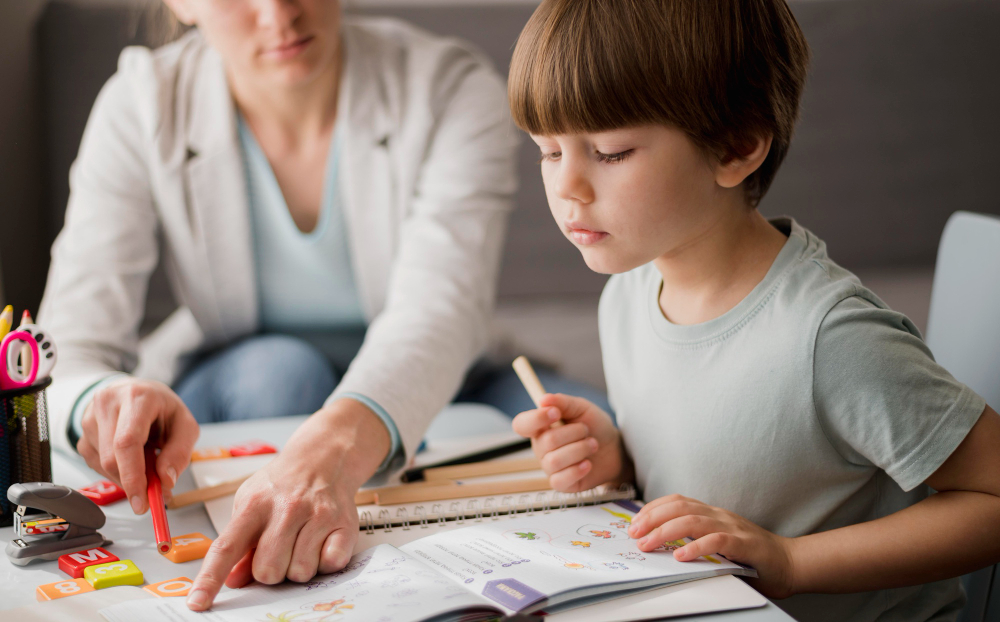Where to start teaching English to children? When and at what age to start?
Oleksandra Kulish
Book expert
Some parents are in a hurry to enrol their child in additional classes as early as possible, while others are afraid of depriving them of their childhood and postpone their education. The truth, as always, is in the middle: serious study is not necessary yet, but you can start learning a foreign language in a playful and useful form from an early age.
Optimal age to start learning a foreign language
Psychologists say that the most favourable age for the introduction of learning a foreign language is from 2 to 9 years old. During this period, children's psyche is the most flexible, and new neural connections are formed especially quickly, making learning English courses for children easy and effective. At the same time, speech skills are actively developing, which allows the child to learn a foreign language well, and if the lessons are conducted by an experienced online tutor, then without an accent.
Bilingual children often start reading books and speaking fluently before their peers. This is due to the fact that at the initial stage they use words from the second language if they have difficulty with pronunciation in the first language. Many parents fear that the child will constantly confuse languages, but these fears are in vain: children who from birth speak two languages, quickly learn to distinguish them and freely switch between them.

Features of learning a foreign language at an early age
It is still difficult for a baby to sit still for a long time and concentrate, so it is important to choose the optimal duration of the lesson. It is equally important to make the lessons exciting. English lessons are perfect for children in a playful way, using bright pictures and interesting educational videos that keep the child's attention. Boring rote learning is difficult and unpleasant even for adults, and for children an attractive and easy presentation of material is all the more crucial.
The impact of early foreign language learning on a child's overall development
During the performance of various human tasks, it is essential that both hemispheres of the brain actively and harmoniously interact with each other. The efficiency of interhemispheric organisation affects emotional stability, mental health, coordination of movements, as well as the success of assimilation and analysis of information.
To understand how the brain works, it is also important to note that in the process of learning and memorising new knowledge, any skills and abilities are fixed in the form of neural connections.
When we communicate in our native language, the left hemisphere is predominantly activated. Since speaking in our native language is natural to us, there is no need to form new neural connections. As a result, our brain does not develop properly.
A completely different situation occurs when learning a foreign language. In this process, both hemispheres of the brain are activated.
We learn vocabulary and grammatical constructions, as well as develop listening skills. As a result, the brain actively forms new neural connections, which leads to an increase in both grey and white matter. In addition, the corpus callosum also develops as it needs to effectively coordinate the interaction between the hemispheres.

Methods and approaches to language learning at preschool age
Today, experts advise to start learning a foreign language from preschool age. Early learning promotes the development of communication skills, improves memory and attention, prepares the child for school and stimulates general development. Every child is capable of learning a foreign language, but it is important to take into account the age specifics and apply the most effective teaching methods.
Let's consider a few of the most successful methods and principles that contribute to the rapid formation of speech, increase interest and motivation to learn the language. Their correct and regular use will help the child to achieve a high level of language proficiency, learn to communicate and overcome the language barrier.
Method of communicative orientation in teaching children
The method of teaching a foreign language to children focuses on the organisation of the learning process with the main goal - the development of communication skills. Language learning includes not only memorising words and grammatical rules, but also the ability to apply them in real-life situations from memory. All tasks in the lessons are aimed at encouraging the child to ask questions, participate in dialogues and share his/her thoughts. This is done by creating learning situations that are as close to real life as possible (school, friends, family, entertainment, household chores).

The principle of parallel teaching of all types of speech activities
Another important feature of foreign language teaching is the need to pay attention to the development of various skills at any stage of learning, including the late stage. Language proficiency implies the ability to perceive the speech of others and to express one's own thoughts. Teaching is aimed at mastering four main types of speech activity: listening (listening comprehension), speaking, reading and writing. For this purpose, pupils are offered a variety of speech exercises.
Use of visuals in teaching
The use of various types of visuals at lessons helps to memorise new words better and facilitates the learning of complex grammatical constructions. It allows to take into account the peculiarities of visual and figurative thinking of the child.
In a modern foreign language course both traditional means of visualisation (pictures, tables, posters) and modern technologies (electronic presentations, audio and video materials, computer themed games) are used.
The principle of taking mother tongue into account
A mother tongue can both facilitate and hinder the process of learning a foreign language. Children master Slavic languages more easily than English or German because they have many similarities. When the structures of languages are similar, it is useful to draw parallels with the mother tongue, which makes it easier to comprehend and memorise new material.
However, if grammatical constructions or lexical elements are significantly different, this can cause difficulties in skill formation, especially in the later stages of learning. In such cases, students are offered special language and speech exercises to overcome these obstacles.

Use of game methods in teaching
The foreign language learning process will not be boring and monotonous if game methods are regularly introduced. The main advantages of such approaches include:
- Effective change of activities.
- Activation of attention and interest of pupils.
- Introducing variety into the learning process.
- Creating a friendly and fun atmosphere in the classroom that encourages lively interaction.
- Increasing motivation for learning.
- Fostering a competitive spirit and a desire to succeed.
Games at lessons help to move from boring rote learning to an exciting and informative process. With their help you can not only consolidate new material, but also check the level of formation of speech skills.
Role-playing games are especially effective in learning a foreign language. During such activities children can reincarnate into different characters, for example, ‘doctors’ or ‘salesmen’, which allows them to show their creative abilities and develop their imagination.
The role of parents in the process of learning a foreign language
Goals - both final and intermediate - are set not by the child and the tutor, but by an adult. Usually, the tutor before the start of lessons has a conversation with parents to clarify what result they expect. Need to successfully pass the entrance exam? Fill gaps in knowledge? Develop your essay writing skills? Or to master conversational English for travelling abroad? The goals can be very different, but it is important to define them before you start working with a tutor. This helps to make the learning process more effective and allows you to track your progress. At the end of the year or term, it will be clear whether the child has achieved the goal.
The tutor will be able to adjust the goal, develop a lesson plan, and determine a timeline for achieving the result. It is important for parents to share with the teacher key information about the child - the peculiarities of his/her learning and possible difficulties. This will help to find an individual approach. Talk about what your child is passionate about. Perhaps he or she likes to read, watch TV series or listen to English-language music. Integrating the learning process with your child's interests will make learning easier and more engaging. Your child will be happy to attend classes and you will not have to force him or her.

Common mistakes in early teaching a child a foreign language
Some parents start preparing their child for English lessons long before they begin. However, there is a risk in this approach: you can lay the wrong ideas about the language, which later requires re-teaching, which is always more difficult than learning from scratch. This can happen both if a parent has no English at all and if they have a good command of English.
Some parents ask the tutor to focus on narrow objectives: ‘expand vocabulary’, “teach to speak”, “emphasise grammar”. However, this approach is not optimal.
It is important to develop all aspects of the language in lessons: grammar, reading, speaking, listening and correct pronunciation. These skills are closely related and cannot exist in isolation. The tutor's job is to provide comprehensive instruction so that the child can confidently use the language in any situation.
You should not expect instant success. There is a so-called ‘silent period’ in language learning. This is a stage when the child does not yet speak the new language, but actively assimilates and memorises information. This process is similar to learning a native language: first the child listens and perceives sounds, then words and phrases, and only after a while does he/she begin to speak.
Give your child time to adapt. Gradual but confident acquisition of the language is a natural and effective way to achieve results.
Other news

183
0

Oleksandra Kulish
Book expert
20 February 2026

171
0

Oleksandra Kulish
Book expert
19 February 2026

469
0

Oleksandra Kulish
Book expert
30 January 2026






